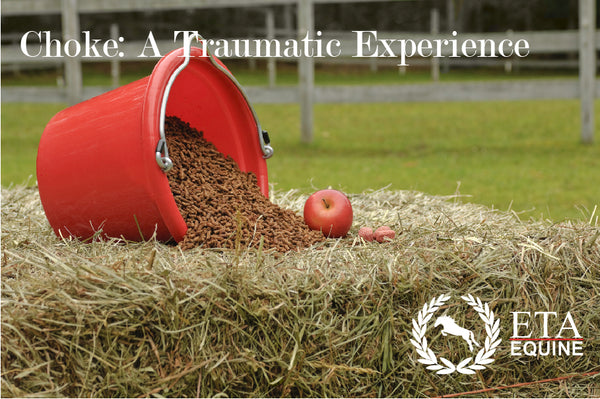Choke: A Traumatic Experience For Horse And Rider

What is choke?
Choke occurs when there is a blockage in a horse’s esophagus. This blockage can either be due to natural food material or due to a horse ingesting a foreign object of some kind. A horse that suffers from choke will still be able to breathe, as only the esophagus is blocked. Since a horse cannot vomit, it is important to notify a vet right away for treatment. If not treated quickly a horse will become severely dehydrated as it cannot swallow food or water.
Beyond becoming severely dehydrated, choke has a chance of developing into an aspiration pneumonia. An aspiration pneumonia is a kind of bronchopneumonia that develops from foreign materials, including food, entering the bronchial tree. Since a horse cant swallow when suffering from choke, there is a the risk of a build up of additional fluids or material in the esophagus. If any of the fluid or material accumulates enough to reach the pharynx (the section of the throat where the trachea splits from the esophagus) then it spill over into the trachea and lungs causing an aspiration pneumonia.
What causes it?
Chewing: Horses normally chews 70-90 times a minute and will grind its food down to 1.5mm or .06 inches. With this much chewing it is easy to see how important of a role it plays in a horse’s digestive system. A horse that can’t properly grind down its hay or feed will be at risk of choke. Horses with dental issues or horses that bolt their feed are most at risk of choke from chewing complications.
Dry feed: Can cause choke in a horse, especially if the horse does not have access to water or if a horse has chewing difficulties covered above. Feeds that are pelleted and cubed are generally those that pose the greatest risk. Soaking the feed before giving to a horse is a good way to help minimize the risk caused by dry feed.
Foreign objects: This is when a horse ingests any material that cannot be digested properly or are not edible at all, such as wood. Horses that are cribbers and horses that are prone to chewing are those most at risk of choke caused by foreign objects.
Signs of choke
- Difficulty swallowing.
- Coughing.
- Disinterest in food.
- Increased heart rate due to animal distress.
- Extending the neck and head, usually in a downward direction.
- Discharge from the nostrils. Usually green in colour though it can also look yellow or clear. Often looks like vomit, though it is not as horses cannot vomit.
- Increased salivation, and or saliva drooling from the mouth.
- A lump on the side of the neck is visible or can be palpated where the esophagus is blocked. It is normally most obvious on the left side of the neck.
Treatment
The only means of safely treating a horse suffering from choke is to notify a veterinarian right away. A vet will determine if the material blocking the esophagus can either be washed down, broken up and pushed down, or if it should be removed by making an incision in the esophagus through the side of a horse’s neck. If you suspect a horse of suffering from choke, then the horse should be deprived of food and drink until properly examined by a veterinarian. If food and drink is consumed by a horse suffering from choke it could lead to an aspiration pneumonia as explained previously.
Prevention
As a horse owner or rider there is little that can be done other than calling a veterinarian once choke occurs. You can however ensure preventive measures against choke, especially if you know some of your horses are prone to choke or at risk (such as horses with bad teeth or those that bolt feed). Here are just a few of the thing that can be done to help prevent choke from occurring.
- Always provide water for the horse.
- Soak dry food before feeding to horses prone to choke.
- Change feeds gradually.
- Discourage the bolting of food by spreading out feed, placing large flat stones (large enough a horse can’t swallow) or salt blocks in the bin so a horse must slow down to feed.
- Feeding smaller meals more often is a good choice as horses are trickle feeders. They naturally eat small meals many times throughout the day. A horse’s stomach can only hold 2 kilograms or roughly 4.4 lbs of material at any one time.
- Cut apples, carrots, or treats in smaller pieces.
- Withhold feed materials for one hour after sedation.
ETA-Equine hay
ETA-Equine hay is a good choice for all horses including those prone to choke. Our hay mix blends are long stemmed to promote longer chewing periods, making it harder for horses to bolt the hay. ETA-Equine hay is ideal for trickle feeding horses and keeping their feeding habits closest to how they are in nature. It is also a hay mix blend that is a complete forage, reducing the need for feeds in order to complement the forage. Less processed feed in a diet means less chance for choke to occur from dry feed.
It is for these reasons and more that ETA-Equine hay is fast becoming the trusted equine hay producer to equestrian athletes.
X